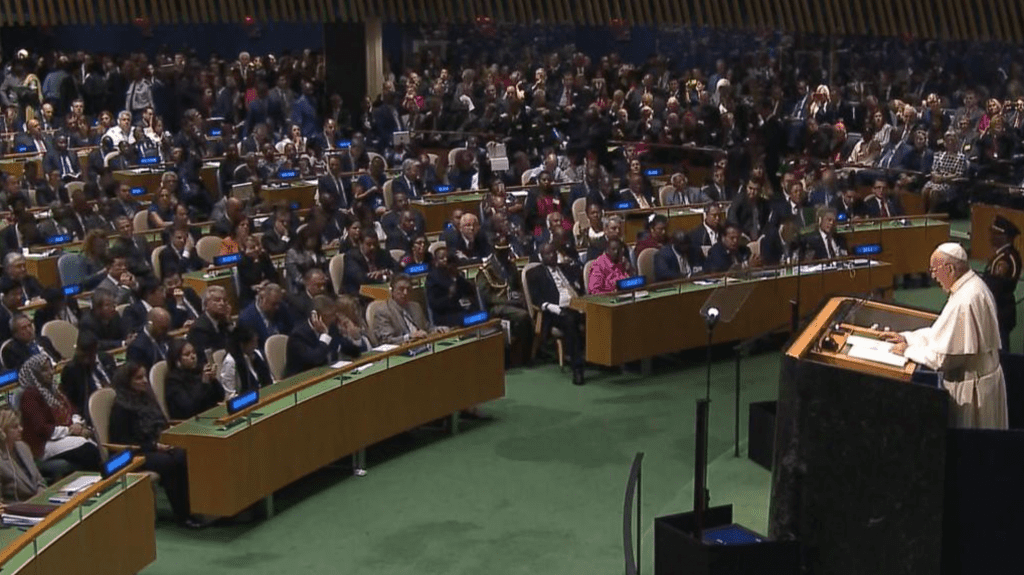If you missed Pope Francis’ address to the United Nations this morning, you missed yet another wonderful mic dropping speech.
Don’t get me wrong. There are plenty of things the Pope and I disagree on, but I never cease to be amazed at the courage, grace, and eloquence he brings to divisive and controversial issues; of which the very controversial nature of many is simply baffling.
I could probably cut and paste his entire speech because there was so much great stuff in there, but in the spirit of TL;DR, I thought I’d just highlight a few quotes that really stuck out to me, followed by a few quick thoughts of my own.
Certainly, many grave problems remain to be resolved, yet it is clear that, without all those interventions on the international level, mankind would not have been able to survive the unchecked use of its own possibilities. Every one of these political, juridical and technical advances is a path towards attaining the ideal of human fraternity and a means for its greater realization.
Obviously those aren’t necessarily the kind of inspiring of words you might put on a poster, but the idea of the common good and working together are recurring and foundational themes to virtually everything the Pope has said so far during his visit to the United States. To understand and/or fully appreciate what follows, it’s important to recognize how central the dual, interconnected themes of the common good and working together to achieve that common good are to Pope Francis.
To give to each his own, to cite the classic definition of justice, means that no human individual or group can consider itself absolute, permitted to bypass the dignity and the rights of other individuals or their social groupings. The effective distribution of power (political, economic, defense-related, technological, etc.) among a plurality of subjects, and the creation of a juridical system for regulating claims and interests, are one concrete way of limiting power. Yet today’s world presents us with many false rights and – at the same time – broad sectors which are vulnerable, victims of power badly exercised: for example, the natural environment and the vast ranks of the excluded. These sectors are closely interconnected and made increasingly fragile by dominant political and economic relationships. That is why their rights must be forcefully affirmed, by working to protect the environment and by putting an end to exclusion.
I couldn’t see all of their reactions, but I’m guessing the ambassadors from the United States and other global super powers didn’t stand up and applause that remark.
We Christians, together with the other monotheistic religions, believe that the universe is the fruit of a loving decision by the Creator, who permits man respectfully to use creation for the good of his fellow men and for the glory of the Creator; he is not authorized to abuse it, much less to destroy it. In all religions, the environment is a fundamental good.
This quote was part of a larger argument that humanity does not possess an intrinsic right to exploit the environment, but I think it perfectly (or almost perfectly) summarizes the Pope’s environmental theology in a way that is or at least should be difficult for his fellow Christians (who are less inclined to care for the environment) to argue with.
Economic and social exclusion is a complete denial of human fraternity and a grave offense against human rights and the environment.
Another mic dropping statement, this time making a larger point that care for the poor and care for the environment are fundamentally connected for Pope Francis.
War is the negation of all rights and a dramatic assault on the environment. If we want true integral human development for all, we must work tirelessly to avoid war between nations and between peoples.
He may not be a pacifist (at least I don’t think he is?), but Pope Francis clearly isn’t a fan of war…and for good reason.
An ethics and a law based on the threat of mutual destruction – and possibly the destruction of all mankind – are self-contradictory and an affront to the entire framework of the United Nations, which would end up as “nations united by fear and distrust”. There is urgent need to work for a world free of nuclear weapons, in full application of the non-proliferation Treaty, in letter and spirit, with the goal of a complete prohibition of these weapons.
I immediately thought back to my International Relations class in college when I heard these words. Back then I thought, “Oh yeah, the theory of Mutually Assured Destruction makes a lot of sense.” But you know what makes even more sense for keeping the world safe? No more nuclear weapons. Period.
Along the same lines I would mention another kind of conflict which is not always so open, yet is silently killing millions of people. Another kind of war experienced by many of our societies as a result of the narcotics trade. A war which is taken for granted and poorly fought. Drug trafficking is by its very nature accompanied by trafficking in persons, money laundering, the arms trade, child exploitation and other forms of corruption. A corruption which has penetrated to different levels of social, political, military, artistic and religious life, and, in many cases, has given rise to a parallel structure which threatens the credibility of our institutions.
I have to be honest. I was shocked to hear Pope Francis speak about the war on drugs and the violence caused by the trafficking and drug use that war was supposed to end. While I’m not entirely clear on what he was arguing for or against (a better fought war or no war at all?), as someone who finds the war on drugs to be deeply problematic, I was pleasantly surprised to see a Christian leader raise concerns when so many other Christian leaders remain either silent or blindly support the so-called war on drugs without considering the collateral damage.
The common home of all men and women must continue to rise on the foundations of a right understanding of universal fraternity and respect for the sacredness of every human life, of every man and every woman, the poor, the elderly, children, the infirm, the unborn, the unemployed, the abandoned, those considered disposable because they are only considered as part of a statistic. This common home of all men and women must also be built on the understanding of a certain sacredness of created nature.
Back to the common good/common home theme we’ve heard so much about from Pope Francis the last couple of days. What really stood out to me about this particular quote is the claim he’s making, a claim that surely won’t sit well for the large number of conservative Americans who are passionately pro-life and just as passionately convinced climate change is some sort of liberal conspiracy. For Pope Francis, however, if you are pro-life, you must also be pro-enviroment and vice-versa.
Ok, I’ll stop before I just copy and paste the entire transcript. But, like I said, there was tons of great stuff in the Pope’s address – to say nothing of his speech to Congress and his address at the White House. I would really encourage you to listen to all three if have the chance. Or read the transcripts for yourself.
I promise it will be time well spent.
TRANSCRIPT LINKS

 (
(










